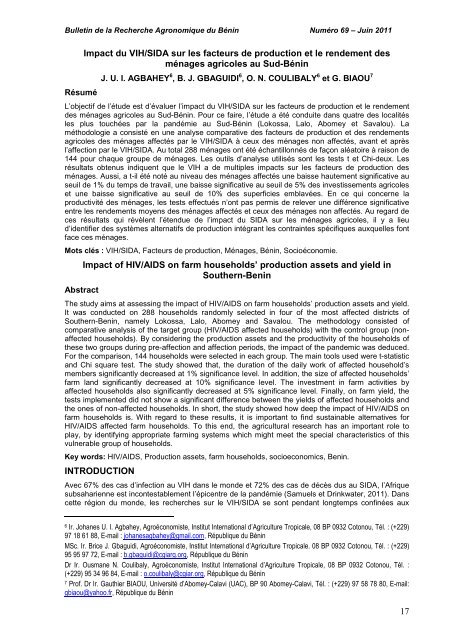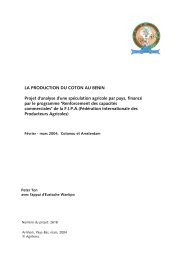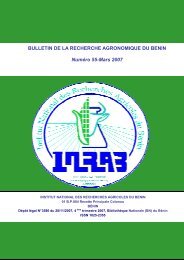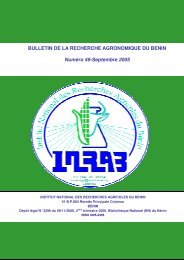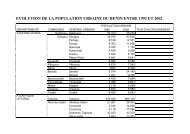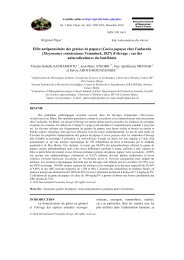Lien externe ou de téléchargement - Slire
Lien externe ou de téléchargement - Slire
Lien externe ou de téléchargement - Slire
- No tags were found...
You also want an ePaper? Increase the reach of your titles
YUMPU automatically turns print PDFs into web optimized ePapers that Google loves.
Bulletin <strong>de</strong> la Recherche Agronomique du Bénin Numéro 69 – Juin 2011RésuméImpact du VIH/SIDA sur les facteurs <strong>de</strong> production et le ren<strong>de</strong>ment <strong>de</strong>sménages agricoles au Sud-BéninJ. U. I. AGBAHEY 6 , B. J. GBAGUIDI 6 , O. N. COULIBALY 6 et G. BIAOU 7L’objectif <strong>de</strong> l’étu<strong>de</strong> est d’évaluer l’impact du VIH/SIDA sur les facteurs <strong>de</strong> production et le ren<strong>de</strong>ment<strong>de</strong>s ménages agricoles au Sud-Bénin. P<strong>ou</strong>r ce faire, l’étu<strong>de</strong> a été conduite dans quatre <strong>de</strong>s localitésles plus t<strong>ou</strong>chées par la pandémie au Sud-Bénin (Lokossa, Lalo, Abomey et Saval<strong>ou</strong>). Laméthodologie a consisté en une analyse comparative <strong>de</strong>s facteurs <strong>de</strong> production et <strong>de</strong>s ren<strong>de</strong>mentsagricoles <strong>de</strong>s ménages affectés par le VIH/SIDA à ceux <strong>de</strong>s ménages non affectés, avant et aprèsl’affection par le VIH/SIDA. Au total 288 ménages ont été échantillonnés <strong>de</strong> façon aléatoire à raison <strong>de</strong>144 p<strong>ou</strong>r chaque gr<strong>ou</strong>pe <strong>de</strong> ménages. Les <strong>ou</strong>tils d’analyse utilisés sont les tests t et Chi-<strong>de</strong>ux. Lesrésultats obtenus indiquent que le VIH a <strong>de</strong> multiples impacts sur les facteurs <strong>de</strong> production <strong>de</strong>sménages. Aussi, a t-il été noté au niveau <strong>de</strong>s ménages affectés une baisse hautement significative auseuil <strong>de</strong> 1% du temps <strong>de</strong> travail, une baisse significative au seuil <strong>de</strong> 5% <strong>de</strong>s investissements agricoleset une baisse significative au seuil <strong>de</strong> 10% <strong>de</strong>s superficies emblavées. En ce qui concerne laproductivité <strong>de</strong>s ménages, les tests effectués n’ont pas permis <strong>de</strong> relever une différence significativeentre les ren<strong>de</strong>ments moyens <strong>de</strong>s ménages affectés et ceux <strong>de</strong>s ménages non affectés. Au regard <strong>de</strong>ces résultats qui révèlent l’étendue <strong>de</strong> l’impact du SIDA sur les ménages agricoles, il y a lieud’i<strong>de</strong>ntifier <strong>de</strong>s systèmes alternatifs <strong>de</strong> production intégrant les contraintes spécifiques auxquelles fontface ces ménages.Mots clés : VIH/SIDA, Facteurs <strong>de</strong> production, Ménages, Bénin, Socioéconomie.AbstractImpact of HIV/AIDS on farm h<strong>ou</strong>seholds’ production assets and yield inS<strong>ou</strong>thern-BeninThe study aims at assessing the impact of HIV/AIDS on farm h<strong>ou</strong>seholds’ production assets and yield.It was conducted on 288 h<strong>ou</strong>seholds randomly selected in f<strong>ou</strong>r of the most affected districts ofS<strong>ou</strong>thern-Benin, namely Lokossa, Lalo, Abomey and Saval<strong>ou</strong>. The methodology consisted ofcomparative analysis of the target gr<strong>ou</strong>p (HIV/AIDS affected h<strong>ou</strong>seholds) with the control gr<strong>ou</strong>p (nonaffectedh<strong>ou</strong>seholds). By consi<strong>de</strong>ring the production assets and the productivity of the h<strong>ou</strong>seholds ofthese two gr<strong>ou</strong>ps during pre-affection and affection periods, the impact of the pan<strong>de</strong>mic was <strong>de</strong>duced.For the comparison, 144 h<strong>ou</strong>seholds were selected in each gr<strong>ou</strong>p. The main tools used were t-statisticand Chi square test. The study showed that, the duration of the daily work of affected h<strong>ou</strong>sehold’smembers significantly <strong>de</strong>creased at 1% significance level. In addition, the size of affected h<strong>ou</strong>seholds’farm land significantly <strong>de</strong>creased at 10% significance level. The investment in farm activities byaffected h<strong>ou</strong>seholds also significantly <strong>de</strong>creased at 5% significance level. Finally, on farm yield, thetests implemented did not show a significant difference between the yields of affected h<strong>ou</strong>seholds andthe ones of non-affected h<strong>ou</strong>seholds. In short, the study showed how <strong>de</strong>ep the impact of HIV/AIDS onfarm h<strong>ou</strong>seholds is. With regard to these results, it is important to find sustainable alternatives forHIV/AIDS affected farm h<strong>ou</strong>seholds. To this end, the agricultural research has an important role toplay, by i<strong>de</strong>ntifying appropriate farming systems which might meet the special characteristics of thisvulnerable gr<strong>ou</strong>p of h<strong>ou</strong>seholds.Key words: HIV/AIDS, Production assets, farm h<strong>ou</strong>seholds, socioeconomics, Benin.INTRODUCTIONAvec 67% <strong>de</strong>s cas d’infection au VIH dans le mon<strong>de</strong> et 72% <strong>de</strong>s cas <strong>de</strong> décès dus au SIDA, l’Afriquesubsaharienne est incontestablement l’épicentre <strong>de</strong> la pandémie (Samuels et Drinkwater, 2011). Danscette région du mon<strong>de</strong>, les recherches sur le VIH/SIDA se sont pendant longtemps confinées aux6 Ir. Johanes U. I. Agbahey, Agroéconomiste, Institut International d’Agriculture Tropicale, 08 BP 0932 Coton<strong>ou</strong>, Tél. : (+229)97 18 61 88, E-mail : johanesagbahey@gmail.com, République du BéninMSc. Ir. Brice J. Gbaguidi, Agroéconomiste, Institut International d’Agriculture Tropicale. 08 BP 0932 Coton<strong>ou</strong>, Tél. : (+229)95 95 97 72, E-mail : b.gbaguidi@cgiarg.org, République du BéninDr Ir. Ousmane N. C<strong>ou</strong>libaly, Agroéconomiste, Institut International d’Agriculture Tropicale, 08 BP 0932 Coton<strong>ou</strong>, Tél. :(+229) 95 34 96 84, E-mail : o.c<strong>ou</strong>libaly@cgiar.org, République du Bénin7 Prof. Dr Ir. Gauthier BIAOU, Université d’Abomey-Calavi (UAC), BP 90 Abomey-Calavi, Tél. : (+229) 97 58 78 80, E-mail:gbia<strong>ou</strong>@yahoo.fr, République du Bénin17


